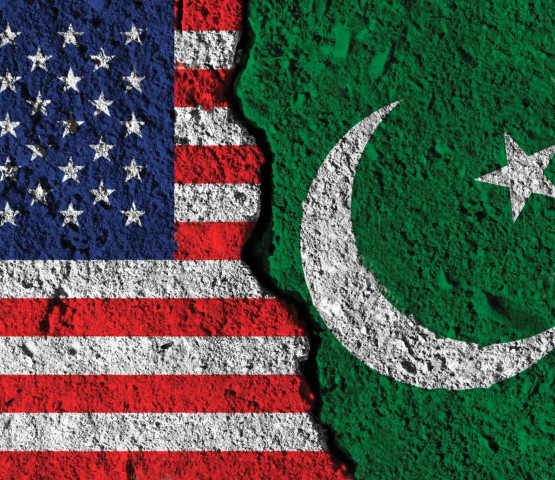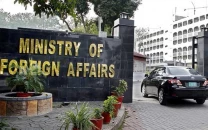Two bodies to engage US in tariff negotiations
Two bodies to engage US in tariff negotiations

Pakistan on Friday constituted two high-powered bodies to lower tariffs on its imports from the United States as a confidence building measure and initiate trade negotiations in response to 29% additional tariffs on the Pakistani exports by President Donald Trump.
Prime Minister Shehbaz Sharif established a policy Steering Committee and a technical Working Group to take advantage of an "early mover" nation, showing seriousness to engage with Washington instead of becoming member of any regional bloc or taking any retaliatory steps.
Shehbaz established the steering committee under the chairmanship of Finance Minister Muhammad Aurangzeb. The working group has also been setup for preparing responses that would be headed by Commerce Secretary Jawad Paul, according to separate notifications issued by the government.
These two bodies have representation of the federal cabinet, the country's embassy in Washington, permanent mission in the World Trade Organization (WTO), leading exporters to the US and the trade experts. The Express Tribune earlier reported that Pakistan would take reconciliatory path and would establish contacts with the US trade representative to explain its position.
The development came on the heels of escalating trade war after President Trump hit 60 nations with worst ever tariffs. China on Friday escalated the war and announced counter 34% tariffs on all American goods with effect from April 10th – a day after the US 34% tariffs on Chinese goods will take effect. The escalation led to meltdown of stock markets with investors rushing for safer bets.
The Steering Committee will include the commerce, and the petroleum ministers, Special Assistant to Prime Minister on Industries, the Federal Board of Revenue (FBR) chairman, foreign secretary, Pakistan's ambassador to the US, Pakistan's permanent representative to WTO, former WTO ambassador Dr Manzoor Ahmad, economist Dr Ijaz Nabi, commerce secretary, and the minister of trade and investment to Washington.
The steering committee would supervise the work of the Working Group, and it will deliberate and approve the recommendations made by the Working Group in response to the US tariffs. The committee will also negotiate with the US, and keep the prime minister in the loop about these rapidly taking place developments.
According to the second notification, a 19-member Working Group has also been set up. This group would comprise secretaries of commerce, national food security, and information technology. The other members are Azmat Mehmood, former trade and investment minister to Washington, Ali Sarfraz, permanent representative to WTO, Imran Mohmand, director general, Customs, FBR, member, Custom, Policy, FBR, additional Foreign secretary, Trade Minister to Washington Hanif Channa and joint secretary, Tariffs, of Commerce Ministry.
Pakistan's leading exporter to US Musadaq Zulqarnain, Bashir Ali Mohammad, Dr Khurram Tariq, Shahid Soorty, Fawad Anwar as Pakistan Textile Council chairman, Dr Mohammad Saeed, Dr Manzoor Ahmad and Musharraf Zaidi are the other members of the Working Group.
The Working Group will analyse the US reciprocal tariffs and will study the implications of these tariffs on Pakistan and other countries. The Working Group will propose measures for tariff rationalisation for confidence-building measures for subsequent trade negotiations, according to the notification.
It will also propose measures to mitigate the adverse impact of the US tariffs on Pakistani exports and propose strategy to gaining early move advantage.
US concerns
The United State trade representative has listed its concerns against Pakistan in its report on foreign trade barriers, mentioning all the nations that were exposed to unilateral trade action of the President Donald Trump.
However, these issues have already been flagged by the US during bilateral talks under the Trade and Investment Framework Agreement (TIFA). Most of these concerns are related to Pakistan's past moves of imposing additional duties on imported goods to generate revenues or to restrict imports due to thin foreign exchange reserves.
According to the USTR report, Pakistan's average Most-Favoured-Nation (MFN) applied tariff rate was 10.3% in 2023 and its average MFN applied rate was 13% for agricultural products and 9.9% for non-agricultural products.
The report stated that the US companies cited concerns that Pakistan had been imposing high tariff rates and, in some cases, additional duties, on products such as automobiles and finished goods. In addition, Pakistan granted sector- and product-specific import duty exemptions, concessions, and protections through the promulgation of statutory regulatory orders (SROs).
Under previous International Monetary Fund (IMF) programmes, Pakistan pledged to limit the use of SROs to genuine emergencies. However, SROs continue to be issued, and Pakistan had not provided a timeline for their removal, it added.
Pakistan permits the importation of certain goods only by the public sector or industrial consumers (eg, active ingredients for the formulation or manufacturing of pesticides). Some imports require approvals from the federal-level ministries such as the Ministry of Climate Change, Ministry of Interior, and the Ministry of National Health Services, Regulations and Coordination.
Imports of certain products, including food colours, waste, parings, and scrap plastics, must receive official certification by the exporting country or by a specialised pre-shipment inspection company.
Pakistan has also banned the import and export of wheat. The US food and consumer product exporters expressed concerns regarding a lack of uniformity in customs valuation in Pakistan that negatively affects US stakeholders.
Similarly, in the machinery and materials sectors, there are reports that customs officials erroneously assessed the customs value of goods based on a set of minimum values rather than the declared transaction value.
The US companies reported being adversely affected by Customs Rules 389 and 391, which required the placement of a physical invoice and packing list in the shipping container and places the responsibility of including such documents, and liability for failure to comply, on the owner of the goods and the carrier.
Pakistan continued to ban imports of beef and beef products from the United States. Since 2014, Pakistan had relied more on technical qualifications in its procurements over the lowest cost, but US companies continued to complain of losing tenders based on price, stated the report.
Pakistan remained on the Watch List in the 2024 Special 301 Report. Intellectual property (IP) concerns in Pakistan were raised during the April 2024 TIFA inter-sessional meeting, it added. Pakistan released a final version of the Personal Data Protection Act in early 2025.
The draft act establishes strict processing requirements for "certain personal data" and empowers the government of Pakistan to restrict transfers of "certain personal data" to jurisdictions outside of Pakistan, according to the US.
Pakistan routinely blocks access to Internet services on grounds that such services can be used to "undermine national security." Under the Prevention of Electronic Crimes Act (PECA), Pakistan routinely blocks entire social media platforms or demands that sites geo-block posts considered "unlawful online content" according to the report.
The US stated that Pakistan had repeatedly suspended access to mobile data and certain online services in major cities in response to planned protests, large-scale demonstrations, and other perceived unrest. These suspensions undermine a free and open Internet and impede trade in the digital economy by restricting access to information and services and disrupting commercial operations.
Pakistan continues to limit foreign ownership through equity caps in certain sectors, including agriculture, aviation, banking, media, insurance, and securities. Although Pakistani law allowed repatriation of profits, the US and other companies continued to face bureaucratic hurdles repatriating profits, dividends, and royalties from Pakistan, generally coinciding with the government's focus on stemming outflows of US dollars, it added.
Local franchises of US brands reported limitations and extended delays in remitting funds to the United States as a result of SBP policies. Foreign investors in Pakistan regularly reported that both federal and provincial tax regulations are difficult to navigate, frequently citing the lack of transparency in the assessment of taxes, stated the report. The US companies cite corruption and a weak judicial system as substantial disincentives to foreign investment in Pakistan.
























COMMENTS
Comments are moderated and generally will be posted if they are on-topic and not abusive.
For more information, please see our Comments FAQ